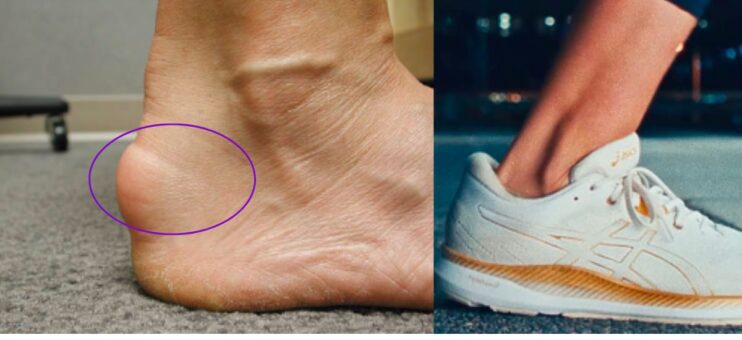Do you enjoy running, hiking, or climbing as an athlete or exercise enthusiast? If this is the case, you may have felt the sharp pain and discomfort of Achilles tendonitis at some time in your life. This prevalent injury affects the back of your calf muscle and can be caused by a number of factors, including overuse, a sudden rise in physical activity, a lack of flexibility, and, yes, even your shoes! In this blog article, we’ll look at whether shoes can cause Achilles tendonitis and what you can do to avoid it. So put on your sneakers and let’s get begun!
What is Achilles Tendonitis?
Achilles tendonitis is an inflammation of the Achilles tendon, which links the calf muscles to the heel bone. Walking, running, and leaping all use the Achilles tendon.
Overuse of the Achilles tendon, such as jogging or playing tennis, can result in Achilles tendonitis. It can also be triggered by a tendon injury, such as a tear or rupture.
Shoes can contribute to Achilles tendinitis. Shoes that are too tight or have high heels can place additional strain on the Achilles tendon, causing inflammation.
Achilles tendonitis can also be caused by wearing sneakers that are not supportive enough.
Causes of Achilles Tendonitis
Achilles tendonitis is an overuse injury to the Achilles tendon, which links your calf muscles to your heel bone. Middle-aged weekend warriors who participate in sports like tennis, basketball, and soccer are prone to the disease.
Achilles tendonitis can also develop in runners and other athletes who place their lower legs under repetitive strain.
Achilles tendonitis has no documented cause, but it is most likely caused by a combination of factors, including:
Overuse or sudden increase in activity level: This can overload and irritate the tendons and muscles surrounding the Achilles.
Tight calf muscles: This can place additional strain on the Achilles tendon.
Bone spur: A bone spur is a tiny bone outgrowth that can rub against and irritate the Achilles tendon.
Flat feet or high arches: This can change the angle of stress on the Achilles tendon and make it more susceptible to injury.
Types of Shoes That Can Cause Achilles Tendonitis
Certain shoes are more prone than others to induce Achilles tendonitis. High heels, flip sandals, shoes with insufficient arch support, and shoes that are too tight or too loose are examples. Running shoes that are too small or too big can also add to this condition.
Signs and Symptoms of Achilles Tendonitis
Achilles tendonitis symptoms include soreness and stiffness in the rear of the ankle, swelling, and tenderness. The discomfort may be worse in the morning or after exertion.
In severe cases, the tendon may thicken and even rupture, necessitating urgent medical care.
You may experience the following signs if you have Achilles tendonitis:
- Pain along the back of your thigh, above your heel
- Achilles tendon stiffness and tenderness
- Difficulty bending or pointing your toes
- Ankle or foot swelling
- A creaking or crackling sound when moving your ankle or touching your Achilles tendon
If you have any of these signs, you should see a doctor right away. Achilles tendonitis is a chronic disease that, if left untreated, can lead to Achilles tendon rupture.
Treatment for Achilles Tendonitis
Depending on the severity of the disease, there are several treatment options for Achilles tendonitis. For mild instances, resting the Achilles tendon and avoiding activities that aggravate the condition may suffice.
This can be supplemented by icing the affected region for 20 minutes at a time several times per day, as well as over-the-counter pain relievers like ibuprofen.
Your doctor may suggest physical therapy to stretch and strengthen the Achilles tendon in more severe cases of Achilles tendonitis.
Wearing a splint or boot may also be necessary to immobilize the area and enable it to heal. A corticosteroid injection may be required in some instances to reduce inflammation.
If conservative measures fail to improve the condition, surgery to repair the Achilles tendon may be needed.
Prevention of Achilles Tendonitis
Achilles tendonitis is a disease that affects the Achilles tendon, which is a large tendon in the back of the ankle. When walking, running, or jumping, the Achilles tendon links the calf muscle to the heel bone.
Overuse of the Achilles tendon causes Achilles tendonitis, which can result in inflammation, discomfort, and even tendon rupture.
Stretching and strengthening exercises for the calf muscles, as well as wearing appropriate shoes with ankle and heel support, can help prevent Achilles tendonitis.
Conclusion Can Shoes Cause Achilles Tendonitis
The data shows that Achilles tendonitis can be brought on by shoes. The likelihood of having this condition is influenced by the kind of shoe worn, its structure and fit, as well as how it is worn.
Although there are many methods to treat Achilles tendonitis, prevention is always the best option.
Therefore, if you are predisposed to or already have tendinopathies, make sure to wear the appropriate shoes and adjust your activities as necessary to minimize any pain or distress brought on by ill-fitting shoes.

